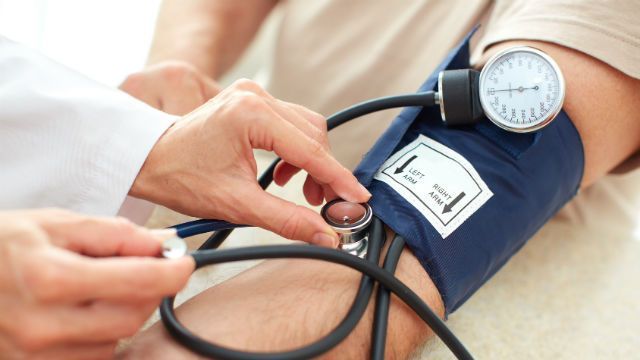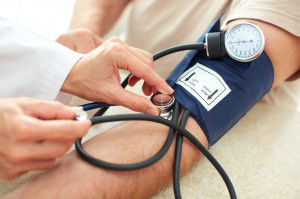
High blood pressure, also known as hypertension, is no joke. When blood pressure, the force of blood against artery walls, goes up, the heart has to work overtime to pump blood throughout the body. This can lead to dangerous health complications.
While some blood pressure risk factors are unavoidable, such as genetics, there are habits that many people have that may significantly raise their risk of hypertension.
One of the main concerns with having high blood pressure is that it paves the way for atherosclerosis, the hardening of the arteries. This, in turn, can lead to stroke, heart attack or other cardiac incidents. According to Dr. Prediman K. Shah, the director of cardiology at Cedars-Sinai Medical Center, “high blood pressure gives you a twofold to fourfold increase in your risk of stroke or heart attack.”
The Mayo Clinic states that besides heart attack and stroke, high blood pressure can lead to other issues, including insomnia, sexual dysfunction (in both men and women), aneurysm, kidney failure, increased risk of osteoporosis, vision loss due to optic neuropathy and increased risk of dementia, due to impaired blood flow to the brain.
The following are six lifestyle factors that may cause blood pressure to rise to dangerous levels:
Uncontrolled stress or anger
When you are faced with stress, the body’s ‘fight or flight’ hormones kick in, your heart starts to beat rapidly and blood pressure skyrockets. These effects dissipate rapidly once a stressful scenario has passed.
However, if you are constantly stressed over the long-term, your blood pressure keeps running on high. It is similar with chronic anger; if you are consistently in a state of rage, your heart has to work overtime and your blood pressure will very likely be high.
Additionally, chronic stress or anger can lead to other unhealthy habits, such as binge drinking, eating processed snacks and smoking, which are all linked to high blood pressure.
To break the cycle of stress and anger, make a decision to invest time and effort in activities that can help relieve it. Deep breathing, meditation and exercise have all been shown to have positive effects. Sometimes, if you are caught in a hectic work or home schedule, simply taking some time for yourself on a regular basis can really help you unwind.
Avoiding exercise
A sedentary lifestyle is a well known gateway to hypertension. One reason for this is that those who are inactive have a higher risk of obesity, which often goes hand-in-hand with high blood pressure. Another reason is that regular exercise has been shown to help lower blood pressure over time.
This may seem counterintuitive, as exercise makes your heart beat faster and temporarily raises blood pressure. However, when you exercise on a regular basis, your blood vessels become trained to expand and contract with greater ease. In essence, your body develops the ability to lower your blood pressure naturally after a workout session.
It is important to note that upon deciding to get active, it is best to start slow and not to overdo it, so your body can adjust. Cardiovascular training without other types of exercise mixed in has been shown to have weaker effects on lowering blood pressure than a mixture of moderate cardio and strength training. Handgrip exercises have also been found to be an effective addition to a well-rounded exercise plan.
Too much sodium
The connection between excess sodium and high blood pressure has long been known. When levels of sodium in the body are too high, the volume of blood increases, and blood pressure increases along with it. Research has shown that consuming an excess of sodium can shorten your lifespan. A large portion of this fatality risk is the increased risk of cardiovascular (and other) complications that stem from high blood pressure.
The biggest sources of the very high sodium content in the American diet are processed foods. Besides high sodium content, these ‘imposter foods’ contain an array of toxic additives, contribute to obesity and chronic illness, and deserve no place in your diet. When you eliminate processed foods you take a huge step towards overall health, including reducing high blood pressure risk.
As far as salting real foods while cooking or on the plate, not all salts are created equal. Refined table salts contain a higher percentage of sodium chloride, added chemicals, and sometimes even added fluoride.
Unprocessed salts, such as Himalayan salt, have a lower sodium fluoride content and none of the added byproducts of processing. Himalayan salt also has essential trace minerals intact that can boost health, not deter from it.
Our favorite unrefined salt is AztecSeaSalt, which is not sold in stores. We know for a fact that it is high-quality, unrefined, and loaded with the good minerals and nutrients you need.
So, as far as salt goes, your body needs some, plain and simple. However, it is important to choose unrefined salts, and not to go overboard. Eating foods with high potassium content is also important, as potassium works to balance sodium levels in the body.
Too much alcohol
Researchers do not yet understand the exact mechanism by which excess alcohol raises blood pressure, but it has been found that it can. While having one or two drinks per day (one for women, two for men is the general rule) can actually help lower the risk of heart disease, going beyond this can be dangerous. According to Dr. Shah, “once you exceed two alcoholic beverages a day, you begin to incur complications, such as an increased risk of high blood pressure.”
It has also been found by some research that drinking on an empty stomach can lead to increases in hypertension risk, so be sure to eat a nutritious meal or snack while sipping your drink.
Smoking
 It is widely known that smoking cigarettes is one of the deadliest habits you can have. One of the many health consequences of smoking is that it can narrow the blood vessels that lead to the arms and legs, and also lead to atherosclerosis. This paves the way for hypertension, heart attack and stroke. Even if you have been smoking for years, research shows that quitting as soon as possible may greatly benefit your overall health.
It is widely known that smoking cigarettes is one of the deadliest habits you can have. One of the many health consequences of smoking is that it can narrow the blood vessels that lead to the arms and legs, and also lead to atherosclerosis. This paves the way for hypertension, heart attack and stroke. Even if you have been smoking for years, research shows that quitting as soon as possible may greatly benefit your overall health.
Birth control pills
Women who take birth control pills that contain estrogen have been found to be at a higher risk of hypertension. While responsible family planning is essential, birth control pills are often a risky option. Talking to your healthcare provider about non-hormone altering forms of birth control may be a very worthwhile conversation, as heightened blood pressure is only one of the many risks associated with them.
Although some people are more prone to high blood pressure than others, avoiding the above-listed risk factors, eating a healthy diet of whole, nutritious foods and staying active can do wonders in keeping your blood pressure in check, and giving your body the best chance of optimal functioning for a healthy life.
-The Alternative Daily
Sources:
http://www.mckinley.illinois.edu/handouts/blood_pressure_factors.html
http://health.yahoo.net/articles/blood-pressure/photos/6-things-affect-mens-blood-pressure#0
http://www.webmd.com/hypertension-high-blood-pressure/guide/blood-pressure-causes
http://www.mayoclinic.org/diseases-conditions/high-blood-pressure/in-depth/stress-and-high-blood-pressure/art-20044190
http://www.mayoclinic.org/diseases-conditions/high-blood-pressure/in-depth/high-blood-pressure/art-20045868
http://articles.mercola.com/sites/articles/archive/2011/09/20/salt-myth.aspx

